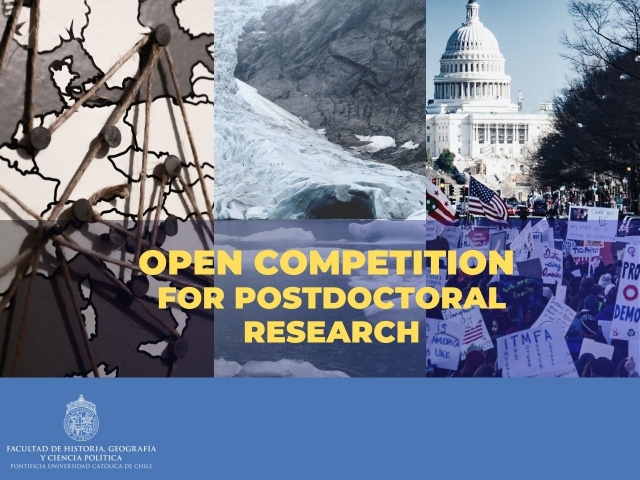Within the framework of the UC 2024 Postdoctoral Fellowship Competition, the Faculty of History, Geography, and Political Science UC has launched a public competition for postdoctoral researcher positions in the themes of "Connected Worlds," "Climate Change," and "Crises and Challenges of Democracy."
This call is the second of three stages in the selection process of the UC 2024 Postdoctoral Fellowship Competition. In this second call, 50 postdoctoral applications will be collected university-wide. In the final stage, 35 of the 50 applications will be funded.
Each of the three Institutes of the Faculty is looking for applicants in the following lines of research:
- Connected Worlds - Institute of History UC - Sponsoring Researcher Manuel Gárate.
The Connected Worlds research line at the Institute of History is composed of historiographical discussions and methodological forms of Global and Transnational History; History of International Relations and Connected and Circulating Histories. Over the last decade, it has become relevant to uncover the simultaneity of historical phenomena and connections beyond explanations centered on simple north/south influence. In this sense, historiography has become increasingly interested in the links and networks of people, goods, and ideas that have traveled the world and are now analyzed from a less centralized perspective. In our continent, the Connected Worlds line has recently been influenced by the gradual opening of official archives, the development of Present Time History, and the contributions of global history.
- Climate Change - Institute of Geography UC - Sponsoring Researcher Fabrice Lambert.
The effects of past, present, and future Climate Change are of paramount importance for South America because of the alteration of hydrological cycles, monsoons, changes in the cryosphere, deepening water scarcity, ecosystem changes, and various socio-natural risks. Present and future climate change poses a great danger to key ecosystems, such as the Amazon, as well as to biodiversity, food, and water security on the continent. Simultaneously, the study of paleoclimatic changes on the continent is key to a better understanding of present and future changes. Earth System Models are key to interpreting empirical paleoclimatic reconstructions, as well as studying climate change and its effects and feedbacks in various components of the critical zone. However, standard configuration Earth System Models have insufficient spatial resolution to study paleoclimatic processes and feedbacks in detail.
The “Community Earth System Model” CESM 2.1.3 is installed at the National High-Performance Computing Laboratory (www.nlhpc.cl) in Santiago, Chile. This model allows for a variable-resolution VR-CESM configuration in which a region of the world can be simulated at a high spatial resolution, while the rest of the world is simulated at standard resolution. We are looking for a postdoctoral researcher with experience in computational clusters and climate models, ideally the CESM. The initial task is to install and validate the VR-CESM at the NLHPC. The region to be simulated at high resolution is the South American continent. The scientific study can be in the paleoclimatic, modern, or future realm, depending on the candidate’s specialization and interests.
- Crisis and Challenges of Democracy - Institute of Political Science UC - Sponsoring Researcher Nicole Jenne.
Democratic systems are increasingly being challenged by both exogenous and endogenous forces, as recent research has demonstrated. On one hand, a growing number of actors seek to win elections and political power, looking to impose ideas that directly or indirectly erode liberal democracy from within. However, global forces promoting doctrines and practices that undermine the liberal international order have proliferated, making it more difficult than ever to address transnational issues such as climate change, world peace, and migration through multilateral cooperation.
We seek postdoctoral researchers interested in addressing the national and international causes and consequences of the crisis and challenges facing democracy. We are open to a plurality of empirical, methodological, and theoretical perspectives and to expertise in any country or region of the world.
Please review further details of this application here.
Postdoctoral conditions:
- Annual stipend for Postdoctoral Researcher: CLP 26 million for up to 2 years
- Initial set-up funding: CLP 2.5 million (1st year)
- Equipment and Investment: CLP 4.5 million (one-time at the start of the project)
- Academic appointment generated by the respective Institute
Requirements:
Applicants for the postdoctoral position must not be more than three years past their doctoral degree, as of the application deadline (Researchers who have obtained the academic degree from September 2, 2021 to September 2, 2024) For female applicants who have had children in the last three years, an additional year per child may be considered (i.e., four or more years after obtaining a doctoral degree).
- Requirements specified by the research project.
Dates: Application deadline: August 15, 2024 Interviews for pre-selected candidates: August 16-26, 2024 Decision announcement: September 12, 2024 Project start: October 2024
Contact: Verónica Correa Esta dirección de correo electrónico está siendo protegida contra los robots de spam. Necesita tener JavaScript habilitado para poder verlo. Apply until August 15th!
